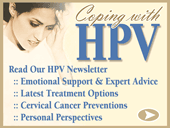 |
|
| National HPV & Cervical Cancer Prevention Resource Center |
|
|

Second
Opinion ASHA hears from thousands each month who have questions about STIs, a large portion of which are inquiries about HPV. This increasingly large volume of questions about HPV is, in part, what spurred us to develop our National HPV Resource Center. While the vast majority of sexually active Americans are estimated to have HPV at some point in their lives, most are never diagnosed clinically and remain unaware they were even exposed. This fits with a typical scenario we see in that many who contact ASHA have never heard of HPV until either they or their partner were diagnosed. People don't understand just how common HPV really is, then, and this can add to feelings of isolation one often experiences when initially learning they have the virus. While the swirl of emotions around HPV is usually short-lived and very manageable, it's not uncommon for those recently diagnosed to tell us they feel alone, as if they are the only ones going through the experience of dealing with HPV. The stigma surrounding STIs doesn't help either, often making it painful to bring the subject up even to those who are closest to us, and to whom we naturally turn for support. And this feeling of vulnerability is understandable! This is not to suggest that all who are diagnosed with HPV go through the same type of emotional turmoil. To the contrary, it is common for people to contact us who are coping well with an HPV diagnosis and are seeking information only about the medical aspects of the virus. Not knowing the facts about HPV can be a source of anxiety, though, that can complicate an already turbulent emotional mixture. For some, connecting with others can be a powerful tool after diagnosis, but this is easier said than done. Recognizing this need for a safe, confidential place, ASHA recently launched its newest service, the STI Message Boards, which include a forum dedicated to HPV discussions. Questions on the medical aspects of HPV
are important to answer, of course, but addressing the emotional
and relationship that often accompany diagnosis with genital
warts or cervical cell changes components is also essential.
We encourage anyone seeking answers and support to use the
HPV forum to ask questions and share thoughts and experiences. |
UPDATED: Frequently
Asked Questions about Cervical Cancer / HPV Vaccine Access in
the U.S. (PDF) |
 |
HPV Vaccine Updates HPV types 16/18, respectively, are found with about 70% of cervical cancers. Primary analysis of the interim data from this study found that Cervarix was 90% effective in blocking precancerous cervical lesions co-infected with HPV 16/18. However, most of the lesions also unexpectedly contained other "high risk" HPV types, leading the investigators to conduct another analysis to determine which HPV types actually caused the lesions. With this additional analysis, which involved confirming presence of the virus both in the lesions and in previous Pap test samples (i.e. determining persistent infection history), the vaccine proved 100% effective in preventing HPV16/18 related cervical precancers. The study, which was published in the June 30th issue of The Lancet (Paavonen et al. 369:2161-2170), also contained data that indicate the vaccine offers cross-protection at 38% efficacy against persistent infections lasting twelve months caused by all high-risk HPV types collectively. GSK submitted Cervarix for review to the U.S. Food and Drug Administration in the spring, with a decision (approval is expected) likely to come in early 2008. In May, regulators in Australia approved the vaccine for the prevention of cervical pre-cancers and cancers in women ages 10-45 years; In July, the regulators in the EU have also have provided a positive recommendation for approval in women ages 10-45 years. Studies suggest the vaccine may be effective in older women: Data presented at the 2007 American Society of Clinical Oncologists Annual Meeting in June indicate Cervarix induces a strong immune response in women up to age 55 (Schwarz et al., Journal of Clinical Oncology, 2007 ASCO Annual Meeting Proceedings Part 1. 25:18S). Another HPV/cervical cancer vaccine, Merck's Gardsil(r), was approved in the U.S. in 2006. Merck recently submitted a supplemental application to the FDA to expand the labeling for Gardasil(r) to include the prevention of vaginal and vulvar cancers. The vaccine is currently approved for the prevention of cervical cancers and precancers, in addition to vulvar and vaginal pre-cancers, related to two "high risk" HPV types (HPV 16 and 18). Gardasil is also licensed for the prevention of genital warts associated with "low risk" HPV types 6 and 11. In clinical trials, Gardasil prevented virtually all persistent infections and diseases related to the four HPV types covered by the vaccine. Early Trials Show Therapeutic HPV Vaccine is Safe An experimental HPV vaccine designed to treat genital warts has shown to be safe midway through clinical trials in Australia, according to the trial manager. The vaccine, currently being studied by researchers at Queensland University in Brisbane, utilizes technology similar to that found in prophylactic HPV vaccines that seek to protect against HPV infection by stimulating an immune response against to virus much higher that what occurs as the result of natural infection. The Australian vaccine is therapeutic, however, in that it's designed to treat existing cases of external genital warts rather than protect against new HPV infections. Pilot studies done by QU's research partner, Wenzhou Medical College in China, showed the vaccine has potential in treating genital warts in humans. A press release on QU's site says more than 200 subjects have participated in trials for the vaccine. Trial manager Dr. David Jardine told HPV News "The primary aim of this phase 1B trial are safety and tolerability, which has been shown to date in the trial with no serious adverse events reported in Australia or China at the halfway mark." Dr. Jardine says the trial is slated to continue through April 2008, with investigators now focusing on the effectiveness of the vaccine. |
Featured Resources Share Your Story about HPV - and read others' experiences. Is there an HPV Support Group near you? |
| Need information about?... • Donations to ASHA • Clinical Trials • STI Hotline • Herpes Newsletter • HPV Newsletter • Teen Sexual Health • Talking to Your Kids • Using a Condom • Links to Related Sites • ASHA Product Catalog • STI Message Board |

